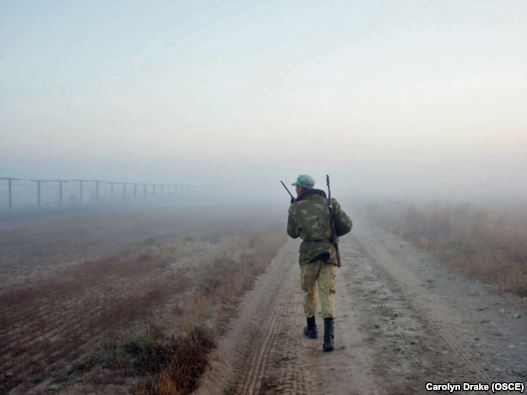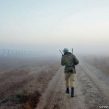
Taliban and Afghan Military Clash near Turkmenistan’s Border
Publication: Eurasia Daily Monitor Volume: 10 Issue: 85
By:

In recent weeks, clashes between government troops and Taliban fighters have shifted to Faryab Province of Afghanistan near the border with Turkmenistan. In the wake of the violence, thousands have fled their homes and more than 60 militants were killed. According to Kyrgyzstan’s Defense Council Secretary Busurmankul Tabaldiyev, the situation in the Afghanistan provinces bordering on Tajikistan, Uzbekistan and Turkmenistan threatens the security of all Central Asia. “Taliban fighters are starting to control different parts of Afghanistan. These fighters are planning provocations in Central Asia. Pro-Taliban militants of Central Asian and North Caucasian origin [sic] are accumulating in Badakhshan Province, Afghanistan, near the Tajik border,” Tabaldiyev asserted (Ferghananews.com, KyrTAG, April 29)
However many experts are skeptical about the threat the situation in Afghanistan actually poses to Central Asia. “I am sure that the Taliban never planned to invade Central Asia. This is a legend [spread by] Russian political scientists to justify Russian presence in Central Asia,” Umed Babakhanov, the editor-in-chief of the Tajikistan Asia-Plus Media Group, told Jamestown on May 5. Sergei Abashin, the head of the Central Asia department at the Russian Institute of Ethnology, largely agrees with Babakhanov. “On the eve of the withdrawal of the International Security Assistance Force [ISAF] troops, some Central Asia governments are deliberately disseminating rumors about the Afghan threat. By this method, they hope to convince the United States, as well as Russia, to offers them the military support,” Abashin said in an interview with Jamestown on April 29. However, the Russian analyst does not think that there is no Afghan threat at all. “The fears that the Afghan Islamists will be more active in Central Asia after the withdrawal of the International Security Assistance Force troops has some likelihood. The question is in the scale of this ‘expansion,’” Abashin noted.
Nevertheless, it is important not to conflate all security problems in Afghanistan into a single threat. According to Ajdar Kurtov, a researcher at the Russian Institute of Strategic Studies (RISS) and the editor of the magazine “The Problems of National Security,” “The battles near the Turkmenistani border are unconnected to the Taliban’s alleged expansion northward. This is not the first time that Taliban fighters have reached the Afghan border with Turkmenistan, but they never tried to start a war with Turkmenistan.” As he told Jamestown on April 29, Turkmenistan’s President Gurbanguly Berdimuhamedov (like his predecessor Saparmurat Niyazov—better known as Turkmenbashi) has a very good relationship with the Taliban. However, the situation in the Afghan Badakhshan Province is much more complicated. “There are forces here that want to destabilize the situation in Central Asia. Illegal crossings at the Badakhshan part of the Tajik-Afghan border are possible,” Kurtov believes. According to the RISS researcher, the most dangerous threat to Central Asia is not the Afghan Taliban itself, but the Central Asian and, as he noted, North Caucasian militants who fight together with them in Afghanistan against the ISAF troops.
Darvaz District in Tajikistani Badakhshan is probably the most vulnerable part of the Tajikistan-Afghanistan border. The Pyandzh River, which forms the border between the two countries, is narrow here and so it is comfortable for crossing. Unlike other parts of Tajikistan’s Upper Badakhshan region, the majority of the population of Darvaz District is Sunni Muslim (most Pamir people who live in the Badakhshan region of Tajikistan belong to the Ismaili sect of the Shia branch of Islam). During Tajikistan’s 1992–1997 civil war, Darvaz District and the Karategin Valley (which borders it) were a stronghold for the Islamic opposition. In 1999, an Islamic state was declared here. The sale of alcohol was strictly forbidden in the Karategin Valley and Kalaihumb District, and cigarettes were banned as well. In addition, the mujahideen banned music at weddings, except for religious music played on traditional instruments. Criminals were beaten in the mosques not with a stick (as Sharia law dictates), but with the shell of a hand-held grenade launcher. Also, large metal barrels were placed in some villages. The accused was put in the barrel, which was then beaten with a stick (see EDM, September 13, 2012).
Hostilities continued in the region even after the end of the Civil War. In May of 2009, Mullo Abdullo, a former field commander of Tajikistan’s opposition, returned with his fighters to the Karategin Valley from Afghanistan, and government forces responded by carrying out military operations against them. Furthermore, in 2010, more than two dozen prisoners escaped from a detention center in the capital of Tajikistan after a bloody shootout. All were originally arrested during fighting in the Karategin Valley in 2009. These escaped prisoners returned to the Karategin, sparking new military operations in the region by the government. After a prolonged period of heavy fighting, the militants were destroyed, but the resistance in the Karategin Valley was only extinguished on April 15, 2011, when Mullo Abdullo was killed (Novie Izvestia, August 24, 2010; see EDM, September 13, 2012).
However, as Ajdar Kurtov believes, Tajikistan’s military could ward off a hypothetical attack from Afghanistan. “Today, the Tajik army is not the same as it was in the [1990s]. Its level of training and equipment are much better. [Tajikistan’s military was] able to quell the rebellions in the Karategin Valley in 2009–2011 and in Khorog, the capital of the Gorno-Badakhshan Autonomous Province, in the summer of 2012, even without Moscow’s assistance. If an invasion from Afghanistan starts, Dushanbe will ask Moscow for help. I am sure the Kremlin will [provide it]. Also for [militants from Afghanistan] to succeed in an invasion [of Tajikistan, they will require] broad support from local people, but this is unlikely—the mountain Tajiks are tired of fighting. So some turmoil is possible, but a victory of radical Islamists [attempting to infiltrate Tajikistan] is improbable,” Kurtov asserted while speaking with Jamestown on May 5.




